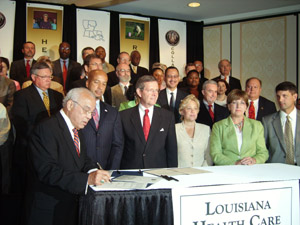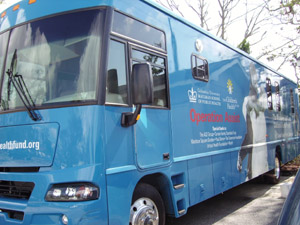Road to repair
- 29 August 2006
Neil Versel
A year on from the tragedy of Hurricane Katrina, the eyes of much of the US healthcare sector are on the devastated Gulf of Mexico region, which is developing an ambitious plan for replacing lost health infrastructure. Interoperable electronic medical records are a centrepiece of this.
If all goes as planned, the formerly inefficient and wasteful healthcare system in this part of America could become a model for modernisation elsewhere. But that is a strikingly large “if”.

Above: Dr Norman Francis, chair of the Louisiana Healthcare Redesign Collaborative, signs a charter promising to rebuild Louisiana’s healthcare system to a higher standard than before.
With the 29 August anniversary of one of the worst natural disasters in US history upon us, healthcare services remain scarce on the Gulf Coast. The number of uninsured is up dramatically, as jobs with health benefits disappeared by the tens of thousands, while immigrant labourers – also without health insurance – have flocked to the area in search of cleanup and construction work. (An estimated 200,000 homes were destroyed across the region.)
In New Orleans, Touro Infirmary, which actually escaped major flood damage, reports a 22 per cent increase in traffic in its emergency department from a year ago, largely because it is just one of two hospitals in the city offering a full line of adult acute care services, down from seven before Katrina.
Across town, in the shattered Mid City section of New Orleans, solo GP Dr Robert Kenny advises the elderly and infirm to stay away until the housing and hospital problems are addressed. “It’s a dangerous place for someone who is not healthy,” he warns.
Touro chief executive Les Hirsch says: “This city has been shocked by Katrina. It’s become something that’s always there, and people have been spooked by it, basically. Everyone’s been affected by it. If you were here, there’s no way that you couldn’t have been affected by it in some way, and it lives with us every day.”
Successes and struggles
The situation is even more pronounced to the east. In Biloxi, Mississippi, a beach and casino town about two hours’ drive from New Orleans, what passes for paediatric clinics these days are a pair of medically equipped buses from a New York philanthropy.

Above: A mobile healthcare clinic in Biloxi, MI, in the form of a donated coach.
Coastal Family Health Centres, a key provider of ambulatory services to Biloxi, is struggling to rebuild its two main facilities while it operates at five temporary sites, minus the one-third of its 180 employees who did not return. After losing 60,000 paper charts to Katrina’s 10-metre storm surge, the practice wants to install an EMR, but even with free software available, keeping the lights on and the doors open remain greater priorities.
Not far from Biloxi, in Gulfport, Mississippi, is a remarkable success story. Memorial Hospital, just six-tenths of a mile inland from the Gulf of Mexico coast, rode out the storm on generator power, and never once lost its electronic records. In fact, the hospital is ridding its records department of the last paper charts this month.
“What we learned from Katrina was the value of the digital record,” says hospital president and CEO Gary Marchand.
Katrina did prompt Memorial to upgrade its emergency systems because communications in the surrounding communities failed, leaving the hospital to operate almost on an island for days after the storm.
“I can tell you that we will not be cut off from the world should another hurricane occur,” according to medical information officer Dr Richard Ferrans. “I can tell you that we have both desktop and mobile satellite telephones. We have satellite internet. We have redundant telephone switching such that we are not going to be cut off communication-wise.”
What Memorial and others in Mississippi lack is a regional health information organisation (RHIO) to share clinical data with other health providers. Neighbouring Louisiana is building a prototype of one, the Louisiana Health Information Exchange, thanks to a special federal contract awarded in the weeks after Katrina.
Emergency records
|
"Just as you can’t expect the motor of a Chevy to fit in the body of a Mercedes, neither should you expect to fit an antiquated health system into a 21st century model" — Louisiana governor Kathleen Babineaux Blanco
|
The Louisiana contract’s specific use case is to determine the key pieces of information clinicians would need to know if a patient came to an emergency room, and to develop a way to deliver such information. A final report is due 30 September.
Another date to circle on the calendar is 20 October, when Louisiana officials hope to submit a formal application to the US Department of Health and Human Services (HHS), seeking a waiver from two federally funded health programmes.
Dr Roxane Townsend, an official in the Louisiana Department of Health and Hospitals who champions increased use of IT, said that the proposal will focus on primary and preventive care for elderly and indigent patients, as well as the state’s many uninsured residents. There will be incentives for medical practices to make the switch to EMRs and to send data via the Louisiana Health Information Exchange.
This project is part of a wider plan to transform the way health services are delivered throughout the state. A state-chartered body called the Louisiana Health Care Redesign Collaborative has pledged to rebuild healthcare to a higher standard than what existed before Katrina, and the 17 July charter-signing ceremony in New Orleans drew politicians from Louisiana and beyond.
The charter calls for the New Orleans area and the rest of Louisiana to migrate from a centralised, hospital-based system focused on treating acute illnesses to a geographically dispersed, ambulatory model based on prevention. As envisioned, electronic exchange of information would facilitate evidence-based care.
“Just as you can’t expect the motor of a Chevy to fit in the body of a Mercedes,” Louisiana Governor Kathleen Babineaux Blanco said at the event, “neither should you expect to fit an antiquated health system into a 21st century model. We cannot rebuild a system that is incapable of meeting the healthcare needs of today and the healthcare realities of tomorrow.”
HHS Secretary Mike Leavitt, dispatched from Washington for the ceremony, spoke of a system “where people can obtain medical records electronically that are continually updated from every interaction they have, whether it’s in a community health centre, a pharmacy, a hospital or at home.”
Leavitt added: “In a moment as rare as this one, we need to push ourselves to attain our highest aspirations, nothing short. Without adequate healthcare, Katrina wins and Louisiana loses.”
Photos by Neil Versel.




